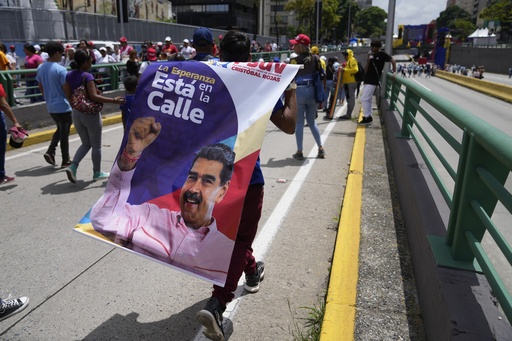CARACAS, Venezuela — Venezuela is gearing up for a crucial electoral challenge on July 28 with its presidential election, a race that could either secure President Nicolas Maduro another six years in office or mark the end of the socialist policies that once effectively uplifted anti-poverty initiatives before leading the country into a long-standing economic crisis.
In past years, opposition leaders had shunned elections they deemed as rigged. However, faced with a dwindling support for the government, former rivals have united forces in an effort to seek a change through the electoral process.
The Unitary Platform coalition has shown considerable strength with millions turning up for the opposition primary, polls, and extensive political gatherings. Nonetheless, the coalition must navigate through obstacles strategically set by the ruling United Socialist Party of Venezuela, which range from restricted opposition campaigning to stringent government oversight of the election procedures, including doubts over fair vote counting.
The Venezuelan government, while promising fair competition, continues to weigh heavily in its favor. Recent regional elections were deemed “the most balanced in 20 years” by European Union observers, who remarked on advantages enjoyed by pro-government candidates such as state funding and preferential access to resources, contrasted with limitations faced by opposition parties. The ruling party is known to use tactics like offering food and state-controlled amenities in exchange for votes, particularly near polling sites.
The electoral climate in Venezuela was further strained by the withdrawal of the EU observers after the government cited economic sanctions. Additionally, the ruling party’s influence extends to the voting system, with loyalists in charge of the National Electoral Council and a dearth of oversight in many polling stations, particularly those with only one or two voting machines.
Regarding the mechanics of the vote, there are an estimated 17 million eligible voters within Venezuela, while 4 million Venezuelans living abroad are also registered to vote, though only a fraction have met the requirements to cast their ballots overseas. Most polling sits within public schools and is safeguarded by military personnel on Election Day. The voting process entails the use of electronic devices that generate both digital and paper records, with instances of voters being manipulated to provide evidence of their support.
Uncertainty looms over the fairness of the vote count, as previous allegations of tampering have eroded trust in the system. Despite calls of electoral fraud, no independent confirmation of such claims has been put forth. The government has been accused of inflating turnout figures, notably by the software company Smartmatic in 2017. The hope among opposition leaders is that a significant majority win could potentially lead to a peaceful transition, contingent on factors like international pressure and concessions, as well as possible exit strategies for Maduro.
